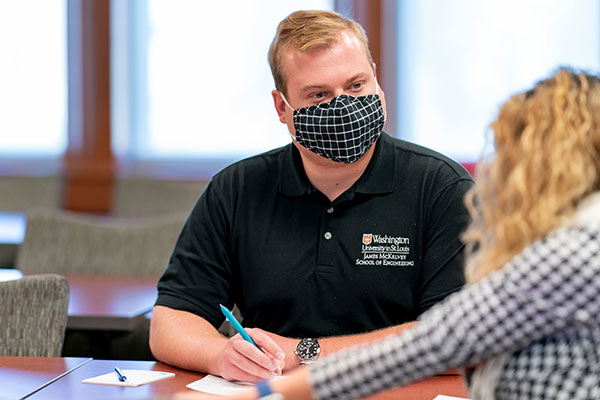A conversation with Tucker Krone
Tucker Krone, lecturer for the Division of Engineering Education, talks about his teaching philosophy and why it’s important for engineers to understand the human impact of their work

Tucker Krone, who earned a bachelor’s degree in biomedical engineering in 2012 from the School of Engineering at Washington University in St. Louis, returned to join the faculty of WashU in 2017. Now a lecturer in the Division of Engineering Education, he’s been named a 2022 recipient of the Dean’s Faculty Award for Excellence in Teaching.
Krone shared his thoughts about his recent award, his goals as an educator and what the McKelvey School of Engineering can do to make engineering education more equitable.
You were a student at WashU. Why did you decide to come back and teach?
I had been a teaching assistant and tutor for the majority of my time as an undergraduate and built close relationships with a couple of faculty members. While I was in graduate school in Iowa, I would stay in touch with them and visit frequently.
Because I had kept up those relationships, when I decided I wanted to go into teaching, I was able to reach out to faculty at WashU, specifically Martha Hasting and Sandra Matteucci. I got lucky with the timing; there were courses that needed teaching, one of which I had helped develop (Engineering Ethics and Sustainability). I'm thrilled to be back, to continue to give back and to be involved as a faculty member and an alumnus. WashU’s a special place and has a way of bringing people back.
How did you feel upon learning you’d been named the recipient of the 2022 recipient of the Dean's Faculty Award for Excellence in Teaching?
I was blown away. It felt incredibly validating to know that students, faculty and staff were a part of the decision-making process. I'm grateful for all the wonderful people whom I work with, whom I teach and who inspire me, and I couldn't have been more grateful.
How would you describe your teaching philosophy?
I do my best to take a more personalized, equity-based approach and to meet students where they are. Depending on the course, it can be difficult to do that kind of teaching, but I try to treat every student as a human first and understand that they need to be physically, mentally and emotionally healthy to learn. I try to make sure no one falls through the cracks and to give everyone the opportunity to succeed in my courses.
I also like humor and having fun. I’m passionate about the topics I teach, so I bring that energy. I wear silly hats in my probability and statistics class to motivate students to show up. I try to bring my personality into the classroom.
Social justice and equity and inclusion are important issues to you. Why should we educate engineers on these topics?
At the end of the day, what engineers do affects people. The goal of engineering is to improve the human experience. We have plenty of examples throughout history where we’ve only improved the experience for certain groups or actively made the experience of one group worse. It's important to remind students that what they do impacts people and to think critically about how to innovate ethically.
It's also important because it helps keep them inspired. If you're up until three in the morning doing problem sets while staring at your computer, you can lose sight of the positive contributions engineering has on the world.
How can McKelvey Engineering encourage these efforts?
There are great faculty members who are developing courses with equity in the title and who are passionate about it. The next steps are to partner with more technical courses to take that passion and bring these broader issues into the classroom.
There's room in every class for inclusion and equity-based examples, and one of the barriers is simply time. A lot of professors are busy teaching, researching or doing service. My hope is to help those faculty and lead collaborations that lower that barrier for instructors who might not feel comfortable doing that work on their own.
You’re a faculty adviser for oSTEM. What has that experience been like?
I love being the faculty adviser because nothing like their organization existed when I was an undergraduate. I'm sure there was a campus-wide queer group, but there was nothing like oSTEM.
That sense of community is important for every discipline, but I think what makes STEM unique is that historically there's a culture of not thinking outside the specific technical impact. For example, improving air quality by X percent or reducing tumor size by X percent, and taking away the identity of individuals involved. Visibility and support are extremely important to challenge some of those cultural historical biases.
I also think in the current climate it's important to continue to be visible and to say, “We're here and we deserve to be treated with respect and value.”
Back to News
